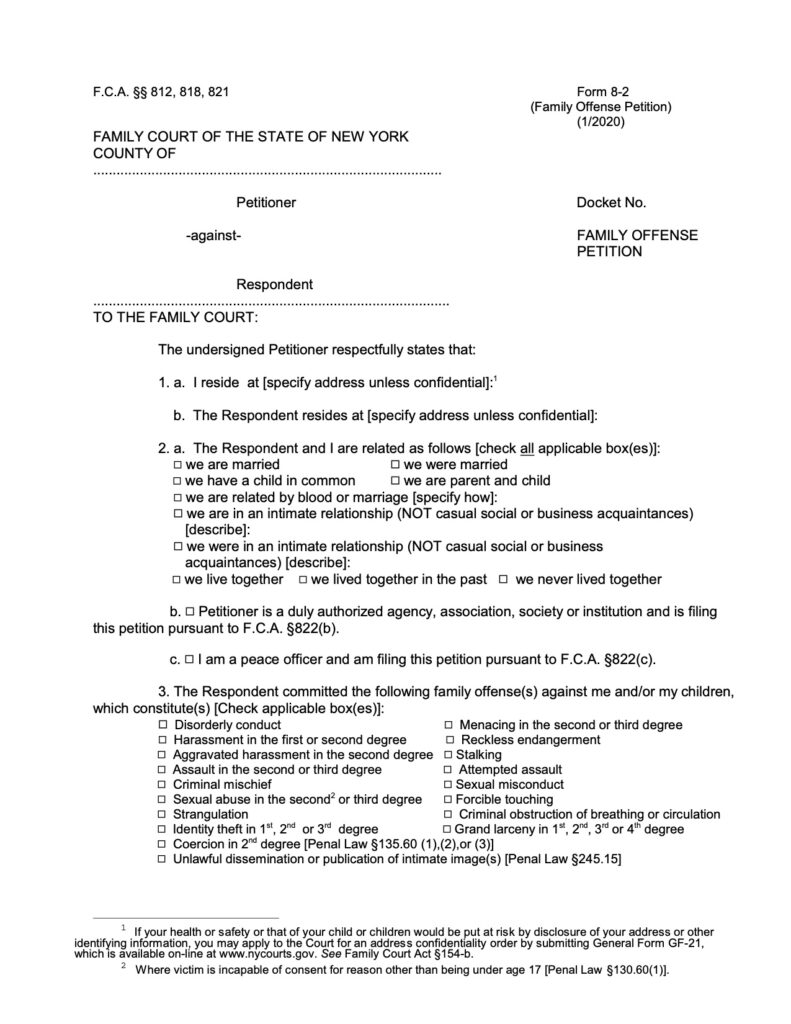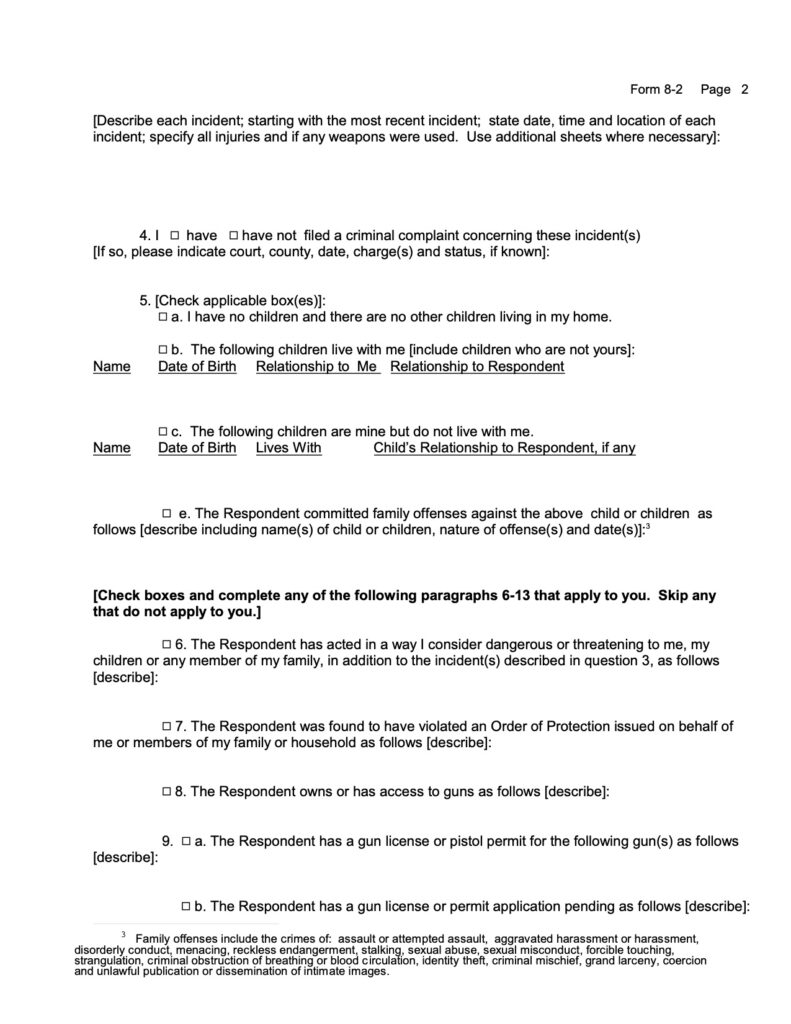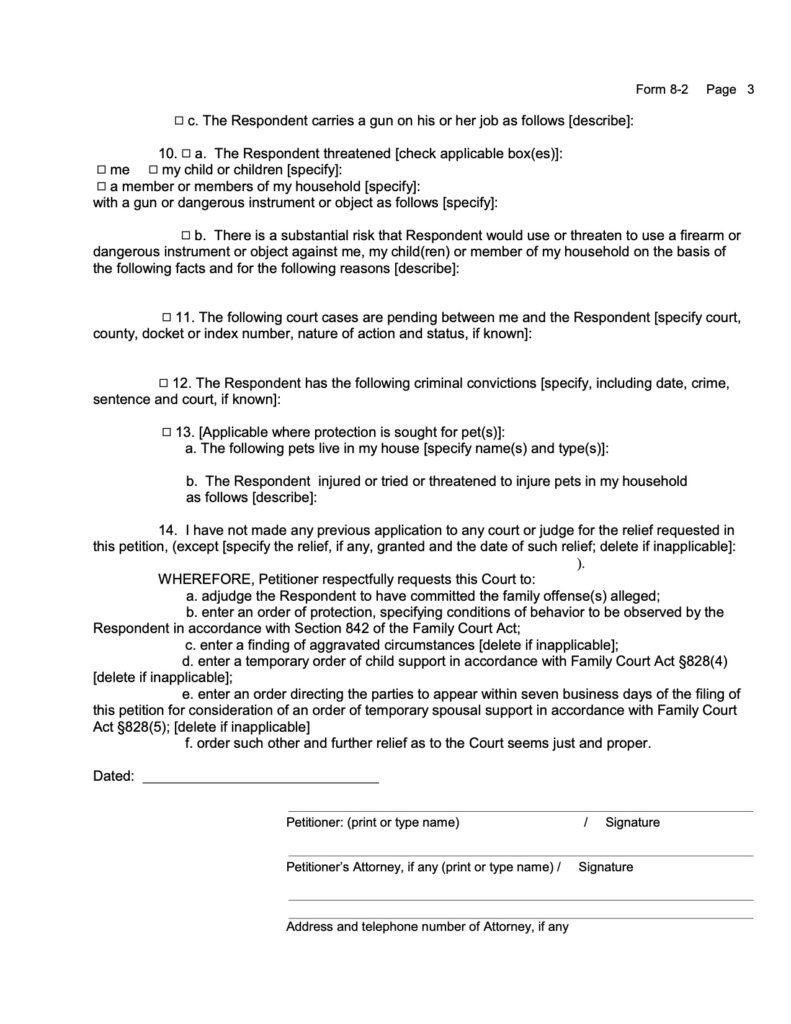New York has a provision under Article 8 of the Family Court Act for victims of Domestic Violence to seek orders of protection through Family Court. If you have been served with a family offense petition, do not worry. Consult and retain a criminal defense attorney to defend a family offense petition.
What is a New York Family Offense Petition?
Under New York Law, individuals are able to seek an order of protection through Family Court against members of their household or their families.
Who Can File a New York Family Offense Petition?
Anyone who has resided in New York State for at least 6 months can file a New York Family Offense Petition against Members of the same household or family is defined as people who:
- Are related by blood;
- Are legally married to one another;
- Are related by marriage;
- Currently or previously have been in an intimate relationship; OR
- Have a child in common regardless of whether the parties have been married or lived together.
What Is Included in a New York Family Offense Petition?
A New York Family Offense Petition is a three page document in which the person seeking the help of Family Court (the “Petitioner”) must describe what criminal conduct a “Respondent” (a family member or member of the same household) committed against them or their children. The Family Offense petition must contain what criminal charges the Respondent committed against the Petitioner as well the description of the conduct that Petitioner believes constitutes criminal offenses. A copy of a blank New York Family Offense Petition is below.
Sample New York Family Offense Petition



Where Can a New York Family Offense Petition Be Filed?
Under New York Family Court Act Section 812, a New York Family Offense Petition can be filed in a county where:
- The alleged acts have occurred;
- Petitioner resides; OR
- Respondent resides.
What Can the Petitioner Ask for In the Family Offense Petition?
Through the New York Family Offense petition, the Petitioner can ask for:
- Exclusion of the Respondent from the shared residence;
- A stay away order (also called an “order of protection”) directing the Respondent to stay away and to have no contact with the Petitioner;
- Refraining from committing any other family or criminal offenses against the Petitioner or the Petitioner’s children or pets;
- Participate in the Batterer’s Education program;
- Surrender firearms and have a firearms license suspended;
- Pay temporary child support;
- Award of child custody to the Petitioner during the pendency of the proceeding.
Ultimately, it will be up to the Family Court Judge to determine what the appropriate remedy is. Some cases will resolve themselves through a settlement that both the Respondent and the Petitioner agree to. Other cases will go to a fact-finding hearing. If the Petitioner establishes by a preponderance of the evidence that Respondent committed a Family Offense, the judge will then do a separate hearing to determine what the appropriate outcome of the Family Court petition is.
How Does Petitioner File a Family Offense Petition?
After completing the form, the Petitioner will need to get the Family Offense Petition approved by the Family Court Judge. This can be accomplished either through an in-person interview in the Courthouse or via phone. If the judge determines that the Petitioner established that a family offense has been committed, the judge will issue a Summons for the Respondent to appear in Court. Frequently, the judge will also issue a temporary order of protection prohibiting the Respondent from having any contact with the Petitioner. This order of protection will be in effect during the pendency of the case, and may ultimately become a permanent order of protection.
What is the Duration of a Final Family Court Order of Protection?
In the event the resolution of the case involves an order of protection, the order of protection that will be issued is called a “final order of protection.” Final Orders of Protection obtained through Family Offense Petitions cannot exceed two years in duration.
How is New York Family Offense Petition Served on the Respondent?
A Family Offense Petition must be hand delivered to the Respondent. Service can be made on any day of the week, including weekends. However, the Respondent must receive the petition at least 24 hours before the Court appearance. Typically, Court appearances are scheduled between 9 and 10 AM.
It is improper for the Petitioner to serve the Respondent personally. If the Respondent receives the Family Offense Petition from the Petitioner, the service is considered invalid and therefore the Petitioner will need to re-serve the Respondent with the Family Offense Petition. Typically, the function of serving a New York Family Offense Petition on the Respondent falls on the police or the Sheriff’s office.
How Do the Police Serve the Family Offense Petition on the Respondent?
If the Petitioner is serving the Respondent with a New York Family Petition through the police, Petitioner will provide a copy of the petition, summons and a temporary order of protection to the police or the Sheriff’s office. They will then attempt service in person at the Respondent’s residence.
What Do I Do If I Have Been Served with a New York Family Offense Petition?
If you have been served by the Sheriffs with a New York Family Offense Petition, do not panic. Take a deep breath.
1. Do Not Violate the Order of Protection
First, whatever you do, do not violate that Temporary Order of Protection. Violations of the Order of Protection are likely to result in the criminal charges against you, which will even further complicate your case. Criminal charges for violating a Family Court Order of Protection may result in misdemeanor or felony charges filed against you. This may subject you to a permanent criminal record, as well as jail time.
2. Hire Counsel to Defend a Family Offense Petition
Second, contact an experienced criminal defense attorney to defend a family offense petition for you. Unlike criminal court, you are not entitled to court appointed counsel. However, having an attorney represent you on a Family Offense petition can make a world of difference in the outcome of your case.
3. Start Getting Evidence Together That Supports Your Story And Make a Timeline
Third, you should thoroughly review the Family Offense petition that the Petitioner has filed against you. Look for any dates, allegations, potential witnesses that you can glean from that New York Family Offense petition.
Then, you should be your own detective and review whatever text messages, emails, call logs, calendar entries, photos etc to establish your own timeline of what happened. You are your attorney’s best resource in disproving the Petitioner’s version of events. Although you may believe that testifying at the fact-finding hearing will disprove the Petitioner’s story because you are telling the truth, that won’t save the day. You need to provide irrefutable evidence that disproves the Petitioner’s story. That can be accomplished by going through your records and making a timeline of what happened, when it happened and whether the Petitioner has committed any family offenses against you.
You will have an opportunity to present this evidence at the fact-finding hearing, or at least have your attorney cross-examine the Petitioner with the evidence. Importantly, you need to be proactive in getting your documents together, because that may take a lot longer than you anticipate. You also get one shot at the fact-finding hearing, so you and your attorney will need to be as prepared as possible.
4. Consider Filing a Cross-Petition
Just because the Petitioner was the first to file a Family Offense Petition, doesn’t mean that you don’t have recourse. Although New York Family Courts try to discourage the filings of cross-petitions against the Respondents, if you have a compelling petition with evidence, the Court may be inclined to accept a cross-petition. Before you file anything, you should consult your attorney about your strategy to defend a Family Offense Petition.
What Happens At The Court Hearing?
Even if you believe the Family Offense Petition is meritless, you must still show up to Court. If you fail to show up, the Judge is able to issue a default judgment against you. That means, that the Judge can find that all the allegations in the petition are true and grant whatever relief the petitioner is seeking. This may include a final order of protection against you. That means, the Petitioner may get everything they are asking for in the Family Offense Petition, without your input. Therefore, it is important that you show up. Preferably with counsel.
Petitioner Can Drop the Family Offense Petition
The Petitioner will have the option of dismissing their Family Offense petition and getting rid of the order of protection. That is a decision that they must reach on their own. Neither you nor anyone on your behalf is permitted to have contact with the Petitioner to talk them into dropping the petition and the order of protection. That is considered third-party contact, which is a violation of the temporary order of protection.
Both You and Petitioner Can Drop Cross-Petitions
If both you and the Petitioner have petitions pending against each other, you can both ask for a dismissal of both. This is called a mutual dismissal. Both petitions and temporary orders of protection will be lifted. If that happens, you and the Petitioner will be allowed to have contact with each other.
You Can Accept a Settlement
You can agree to settle the Family Offense petition by agreeing to the Final Order of Protection. This can be done without an admission of guilt. However, by accepting a final order of protection (even without an admission of guilt), there may be some adverse consequences.
First, even without an admission of guilt, you will have to abide by the order of protection for up to two years. This period can be extended “with good cause” like in the event of continuing abuse. If you violate the order of protection and the Petitioner notifies the police about the violation, you will be arrested and criminally charged for contempt of a court order. These charges may result in a misdemeanor or a felony conviction, as well as jail time.
Second, although the order of protection is not a criminal charge, it is public record. Your order will appear in the NCIC Domestic Violence registry and will be on your record while it’s open. Even if it is not a criminal conviction or a case, many individuals are absolutely against having their name associated with an order of protection.
Judge Conducts a Fact Finding Hearing
If the Petitioner is not withdrawing the petition and if you are not accepting a settlement, the Judge will conduct a fact finding hearing to determine if you committed a Family Offense in New York. The Petitioner will testify about happened, and you (or your attorney) have the right to ask the Petitioner questions. This is called cross-examination. Your attorney is able to cross-examine the Petitioner about the petition that they filed, as well as any other documents that you provide which contradict the Petitioner’s story. That is why it is absolutely essential to turn over whatever you have to your attorney.
You have a right to testify about what happened at the fact finding hearing as well. However, that is to be done only after extensive preparation with your attorney. Your attorney will ask you questions about your version of what happened. Importantly, if you testify, the Petitioner or the Court is able to ask you questions. That is also something your attorney should prepare you for.
At the end of the hearing, the Judge will decide if the Petitioner proved that you committed a Family Offense against the Petitioner by a preponderance of the evidence. This standard means that the Petitioner has to prove that it is more likely than not that you committed an offense. We think of it as about 51% burden of proof, which is significantly lower than “beyond a reasonable doubt.” The standard in New York criminal cases.
If the Petitioner did not prove the case by a preponderance, the Judge will dismiss the petition and vacate the order of protection. If however, the Judge determines that the Petitioner met the burden of proof, the Judge will conduct a separate hearing to determine what the appropriate outcome of the case is. This may include: final order of protection for petitioner, mandating that Respondent attend a Batterer’s program, a suspended sentence etc. Before you decide what to do with your case, you should schedule a consultation with top rated New York City Attorneys.
Contact Experienced Attorneys to Defend a Family Offense Petition
If you have recently received a Family Offense Petition, it is essential that you appear for Court and aggressively defend a Family Offense Petition. Do not delay scheduling a consultation with top rated New York Criminal Defense Attorneys. Time is of the essence with defending New York Family Offense Petitions. Contact us today to schedule your initial consultation.


